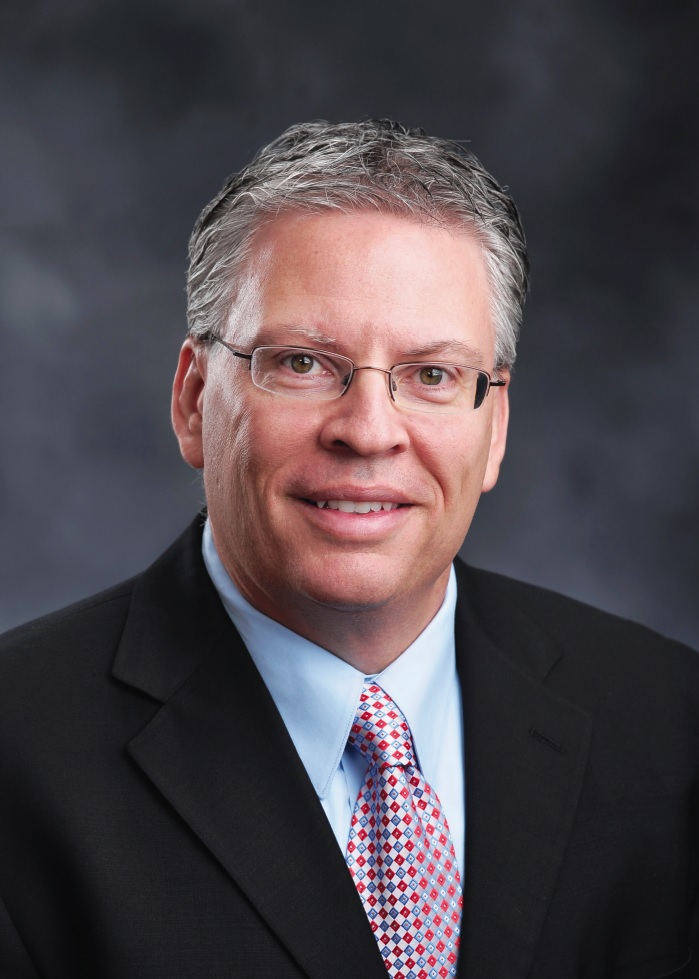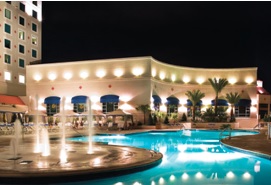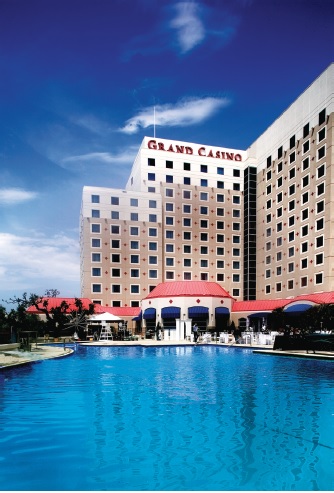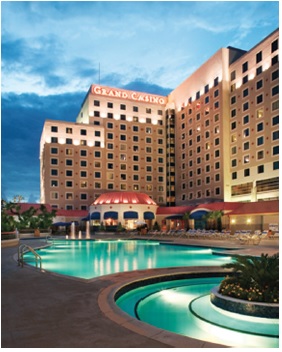Caesars Entertainment's Dean McBride's career has taken him from Alaska to the Gulf of Mexico. By David McKee

Corvallis, Oregon, in the Klamath Valley, in 1961. [Graduated from] the home of the fighting Beavers, Oregon State University. Directly after college, a family member had a business starting in Ketichkan, and part of it was charitable gaming. So I went into gaming immediately after college. From there I become involved in what you and I know as casinos. I moved to Reno, Nevada, in 1990. I spent about three and a half years in Alaska, and spent some time in Portland, Oregon, and relocated to Reno.
The original Harrah’s property [was where he busted in]. Alaska, in the Eighties they legalized what’s called charitable gaming. They used pull tabs. In the South, they’re called Cherry Bells. A nonprofit organization would purchase these through some distributor or the distributor would sell them for them under their license. The gaming jurisdiction was fairly new at the time. Alaska was allowing it for Indian tribes to have bingo and then, to supplement their income, they would have these pull tabs. In the late Eighties and early Nineties you had retail outlets that were these pull tab stores. We were a distributor.
At the time I was really drawn to Reno, Nevada, for personal reasons, so [getting into gaming was] more just luck and fortune. I was fairly new to the casino business, so it was a little crazy and wild for me. Some of the highlights wasn’t great, big capers but it sure was amazing to see as a brand-new person in the business., it was common to see people making fake slot coins, the slang term is ‘slugs.’ They’d make them out of lead and they’d tend to hole up in small hotels on the outskirts of town and melt fishing weights and other very low-end lead material. Over time, they would get a little loony because of all of the snuffing of the lead in this little hot-plate hotel room, so that was a part of the business I never expected to see. Again, these were very shocking to me at the time.
We had an elderly female dealer who would steal chips off the table. She had actually put one in her mouth. So the gaming commission was waiting for her to get off shift and there was some delay. She didn’t get her regular break so she had to stand there with the chip in her mouth and conduct business and deal the game for quite some time. When you’re fresh out of Oregon State, that’s something you’d never heard of or read about.

Another one that particularly stood out was there was someone that’s called a ‘card marker.’ It means they’re just marking the card so you can read the card [and see] what’s about to be dealt or what the dealer has in their hole card or what’s coming out of the shoe, so you could bet accordingly. Well, he was caught and he had a small abrasive material kind of glued to the tip of one of his fingers. I was pretty new and just remember people circling him and were going to arrest him. And he took off running and, in the scuffle, it became apparent that he’d bit off the tip of his own finger. He bit the skin off his finger to hide the evidence. Those kinds of things were a little crazy for someone like me.
The wide swath of society that enjoys casino gambling. That surprised me. I had categorized it or stereotyped it and that was not the case at all. The biggest lesson was from every walk tends toward gambling and I didn’t realize that. There’s a famous attorney and boxing referee by the name of Mills Lane that I respected tremendously. On his lunch breaks he would tend to come in and play a few hands of poker most days. He went on to become famous for two reasons. One, he’d been quoted in the local newspaper after he became the district attorney in Reno and they had a new law that allowed you to protect your home with deadly force. The gist of it was they changed that law to say you no longer could unless your life was threatened. He had a case where some guy tried to break into an elderly couple’s mobile home while they were in it and the burglar got shot and killed, and Mills Lane refused to press charges. So he always stuck in my mind because he had this famous case where, in essence, he went against the new law and that was quite controversial at the time. At later on, he was the one that refereed the Evander Holyfield-Mike Tyson fight where Tyson bit Holyfield’s ear. You find these incredibly gifted and talented people also like to gamble along with your average everyday Joe. And that’s what I found amazing in casinos: That you could see a blue-collar worker next to a state senator or a famous celebrity.
 I had worked my way up to vice president of enterprise surveillance, which meant I was the program manager for the corporation. I would spend time doing things like negotiating prices with manufacturers to creating training processes and procedures, to auditing properties, to overseeing those type of things. And through that job, in about 1996, I started working on a project here on the Gulf Coast where we were working with Jimmy Buffett. We had decided to put together a project here in Biloxi that was going to be called Margaritaville. He had decided he wanted to get into the casino business. We had a relationship with him in Las Vegas. He has a restaurant in one of our casinos, the Flamingo, right on the Strip. So part of my job was to help coordinate this giant resort that we were going to build on the Gulf Coast. The economy was starting to go south so fortunes crossed paths and they wanted to decentralize corporate structure at the time. And that brought me to Biloxi. I was down here, being decentralized as well as working on this beautiful resort we had planned. At the same time they had some struggles at the property that was here already and wanted me to help with the local surveillance team while I did another job. So I was fortunate enough – and that’s the great part about this company – your job description really is that wide. So I was still traveling abroad, I was still working on this construction project and I was still helping support the local surveillance team while they were still looking for a leader. And that became a very good relationship with the local general manager.
I had worked my way up to vice president of enterprise surveillance, which meant I was the program manager for the corporation. I would spend time doing things like negotiating prices with manufacturers to creating training processes and procedures, to auditing properties, to overseeing those type of things. And through that job, in about 1996, I started working on a project here on the Gulf Coast where we were working with Jimmy Buffett. We had decided to put together a project here in Biloxi that was going to be called Margaritaville. He had decided he wanted to get into the casino business. We had a relationship with him in Las Vegas. He has a restaurant in one of our casinos, the Flamingo, right on the Strip. So part of my job was to help coordinate this giant resort that we were going to build on the Gulf Coast. The economy was starting to go south so fortunes crossed paths and they wanted to decentralize corporate structure at the time. And that brought me to Biloxi. I was down here, being decentralized as well as working on this beautiful resort we had planned. At the same time they had some struggles at the property that was here already and wanted me to help with the local surveillance team while I did another job. So I was fortunate enough – and that’s the great part about this company – your job description really is that wide. So I was still traveling abroad, I was still working on this construction project and I was still helping support the local surveillance team while they were still looking for a leader. And that became a very good relationship with the local general manager.
In reality, of course there’s a lot of pressure to learn of course slots and table games and the operations of those businesses, but the beverage world, the gaming regulation, the restaurant operation, the internal controls. So there’s a tremendous amount of pressure to become versed in all those areas. When I was down here, the general manager would take on extra side projects and he became familiar with what we do [?] and ended up losing a casino operations director. Also because of the economy, he had to combine several departments that needed somebody with a lot of experience and a lot of widely varied areas. He had to combine slots and beverage, as well as table games. I happened to get very, very lucky. My job was winding down, they were decentralizing, the economy was taking its toll and I was fortunate enough to have an opening come open right here when all that came together. He approached me about being the director of casino operations, where I would take over – we call it Total Service – and the environmental services cleaning, the internal-services technician that fixes the slot machine, the casino cocktail service and bartenders, as well as dealers and floor supervisors and slot supervisors. All that got packaged under me, and I’ve been doing that the last four years or so.
I’m very fortunate to work for a company that is always offering different aspects to learn. For example, just this last year I worked on – we were endeavoring to get a license in Boston, Massachusetts, and I spent almost two years on preparations and documents submitted for that licensing process. We’re opening up a property in Baltimore, right there on the water, and they asked me to come in and vet some applicants for their surveillance director. We had a Horseshoe Casino open in Cincinnati so, again, I was asked to help vet some folks. We have a corporate structure that asked me to help support logistics for the largest slot purchase that we’ve made in our company, which is 7,000 slot machines. So out of this property, I was able to support all those other properties. That’s pretty exciting. That’s typically not something that happens to a casino-operations guy. That’s what I like best. Literally in one year I worked for Cincinnati and Horseshoe Baltimore and Boston and then ran a pretty heavy table down here. So it’s pretty exciting. What’s not to like?

We have a ton of changes, starting this week. We’ll be completely transforming the whole resort. We’re going to change the name, first thing. It will go from Grand Biloxi. After this summer it’ll be called Harrah’s Gulf Coast. We’re going to upgrade the whole resort: new restaurants, new bars, a renovated casino floor, and then there are some existing structures across the street on the beach; we lease quite a bit of land on the water. It’s going to become an entertainment lawn: everything from concerts to festivals.
Frankly, the Harrah’s brand is a much bigger, better, well-known brand name than the Grand. We have 44 million people in our Total Rewards database and by far those all know the Harrah’s brand. This is me speaking, not a scientific-database guy, I can’t imagine the percentage of people in that database that know the Grand have to be in the low teens. It’s not only an opportunity for us to access millions more people than we can with the Grand name. The Gulf Coast is also a purposeful term, as opposed to Harrah’s Biloxi. Harrah’s Gulf Coast, even if you don’t know where it is, from Pensacola to New Orleans, they also know it as warm weather and water and golfing and fishing and hunting, and beautiful, beautiful white sands for hundreds of miles. It conjures up a lot. The Harrah’s taps into the known Harrah’s brand and the Gulf Coast taps into if you’re marketing in Green Bay, Wisconsin, it’s much easier to say “Gulf Coast,” than it would be to say “Biloxi.” There’s a big effort down here that they’re combining all the convention and business bureaus of all different cities in the Gulf Coast into one. We’re a little bit ahead of the curve but that’s where they’re all heading: To market themselves as a single entity, as they should.
It was a much different vision for this area five years ago, and now I’m speaking out of school. I was involved in the tactical end of the project. The strategic end, I was not. It was just a different economy, a different nation, a different opportunity. So, for a lot of years, it was that we wanted to see how the economy shook out, how our business shook out and how we were going to move forward. Timing, in hindsight, is always better but it feels like the right time for us, moving forward. The market is stable, there’s a lot of new investment coming in from our competitors. We have a great opportunity to take advantage of some things that are coming down.
As we go through it, there won’t be any area in our property, inside or out, that is not touched. So every hotel room will be touched to some extent, the casino floor, 100% of the restaurants, the beautiful pool. There will be little that won’t be touched.
I’m very, very lucky that there’s new grandchildren and nieces and nephews that just came into our lives in the last year, on both coasts, some in Nevada and some in Vermont. It’s just been an unbelievably great time for us. Believe it or not, I really like genealogy and I’m addicted to Ancestry.com. I wish I had a great hobby to tell you about but I’m pretty boring.

















